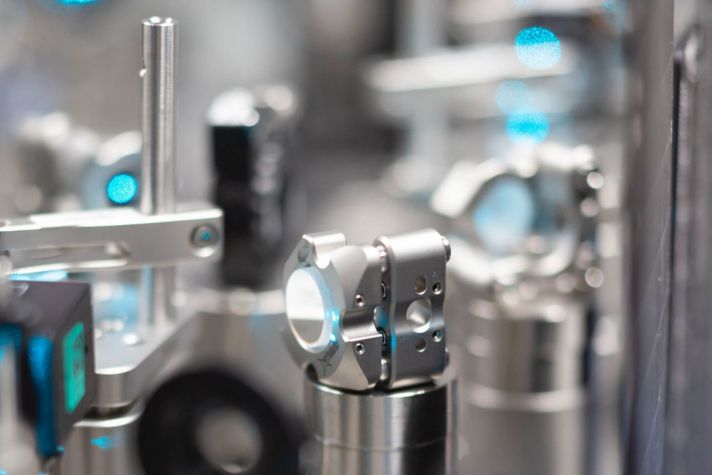-
 Global
Global-
Africa
-
Asia Pacific
-
Europe
-
Latin America
-
Middle East
-
North America
- |
- BUSINESSES
- |
- Contact
- |
-
 Global
Global-
Africa
-
Asia Pacific
-
Europe
-
Latin America
-
Middle East
-
North America
- |
- BUSINESSES
- |
- Contact
- |
You are browsing the product catalog for
You are viewing the overview and resources for
- News
- The World’s Most Powerful Quantum Computer is Here
The World’s Highest Performing Quantum Computer is Here
Get the story behind how Honeywell has delivered the largest quantum volume ever
Our team of scientists, engineers and technicians, have built what is currently the highest performing quantum computer available.
With a quantum volume of 64, the Honeywell quantum computer is twice as powerful as the next alternative in the industry. That means we are closer to industries leveraging our solutions to solve computational problems that are impractical to solve with traditional computers.
“What makes our quantum computers so powerful is having the highest quality qubits, with the lowest error rates. This is a combination of using identical, fully connected qubits and precision control,” said Tony Uttley, president of Honeywell Quantum Solutions.
What does a quantum computer look like?
To envision what a quantum computer looks like, let’s step back in time.
“Imagine what you think of computers of 60 years ago looking like where they take up a full room and they have wires running everywhere,” Tony said. “We’re back there.”
First, there is an ultra-high vacuum chamber. It’s a stainless steel sphere, about the size of a basketball, with portals to allow in laser light, and from which the air has been pumped out such that it contains a vacuum of five times less particles than outer space. The chamber is cryogenically cooled with liquid helium to bring the temperature of the ion trap chip to 10 degrees above absolute zero (approximately negative 441 degrees Fahrenheit, colder than the surface temperature of Pluto).
Within the chamber, electric fields levitate individual atoms 0.1 mm above an ion trap, a silicon chip covered in gold about the size of a quarter. Scientists shine lasers at these positively charged atoms to perform quantum operations.
“For context of how small an atom is, if you cup your hands into a sphere, you’re holding about a trillion trillion atoms,” Tony said.
Meanwhile, there is a lot of equipment to control the quantum computer. Control systems are necessary to precisely manipulate the hundreds of independent electrical signals required to move the ions (qubits) in the intricate dance used for quantum information algorithms. Since the operations are all done with lasers, a multitude of optics are aligned across the optical tables, each specified for the correct color of light. All of this infrastructure takes up roughly two large optical tables (approximately 5 feet wide and 20 feet long), a significant space since the true computing power is harnessed with the few atoms hovering over the trap surface.
What will a quantum computer be used to solve?
Quantum computers harness their power by being able to investigate many potential outcomes at the same time.
That’s where quantum physics comes in.
Traditional computing bits are in a state of either “0” or “1.”
On the other hand, Quantum bits, called qubits, can be in both states at the same time, a property called superposition.
“That means that when you have these qubits interacting with each other in a computation, you get, what I call, a quantum superpower,” Tony said. “You get an exponential expansion in the number of values that can all be considered at the same time.”
Practically, that means that certain computations that can never be done on even the highest performing supercomputer will one day be computed on a quantum computer. One example is the best path of robots in a distribution center to improve speed of selecting items and packing orders (the best answer even supercomputers can’t find!).
Those computations are processed through algorithms designed and developed specifically for quantum computers. These algorithms are similar to classical algorithms from computer science, but also leverage a combination of physics and mathematics expertise. Within quantum’s ecosystem are a number of quantum-algorithm experts, who specialize in “converting” real world problems into quantum-standard algorithms. Honeywell Ventures has invested and partnered with two of the companies that do that, Zapata Computing and Cambridge Quantum Computing.
What does the future of quantum computing hold?
When Honeywell set out to build a quantum computer, we prioritized creating the highest quality qubits, focusing on eliminating the errors present within the system on smaller numbers of qubits and then working to scale up the number of qubits. By having achieved such low errors on our quantum operations, with each new qubit we add to the machine, the quantum volume expands.
That increases the capability of quantum computing that we will be able to bring to our customers.
And thanks to a partnership with Microsoft’s Azure Quantum, we will be able to offer organizations access to our quantum computer both directly through our interface as well as through the Azure Quantum portal.
“The promise of quantum computing, ultimately, is that instead of getting close, you get exact,” Tony said. “You’re able to look at all of those different interactions at exactly the same time to get to an optimal solution.”
Copyright © 2025 Honeywell International Inc.



